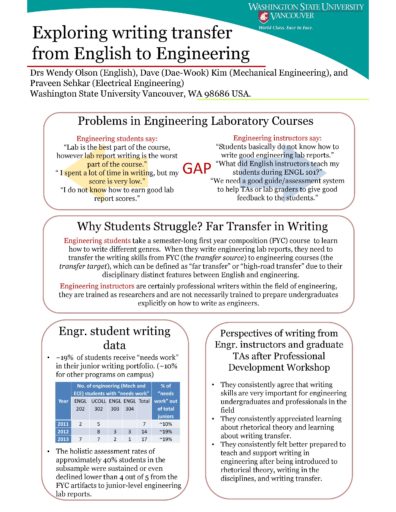Research Results

Olson, W.M., & Kim, D. (2017). Addressing Transfer Conditions across Disciplines: Cultivating Connections from First-Year Composition to Upper-Division Engineering Laboratory Courses. Conference on College Composition and Communication: Portland, OR, March 2017.
Kim D., W. Olson, K. Wandro. (2017) Professional development workshop to promote writing transfer between first-year composition and introductory engineering laboratory courses. Submitted. The Proceedings of 2017 ASEE Annual Conference and Exposition.
Kim, D., Sekhar, P.K. (2016). A Preliminary Study on Supporting Writing Transfer in an Introductory Engineering Laboratory Course. The Proceedings of 2016 ASEE Annual Conference and Exhibition, New Orleans, LA, 2016.
Abstract
Engineering undergraduates are exposed to writing curricula such as first-year composition (FYC) in their early program of study. However, they often have difficulties meeting the expectations of writing in engineering courses. Our goal for this study is to improve engineering students’ writing performances through better understanding of how writing transfer occurs and then applying pedagogical strategies designed to support writing transfer institution-wide. This poster reports preliminary data and findings on improving writing transfer for engineering undergraduates. Instructional materials for lab report informed by a rhetorical approach to writing were piloted in an introductory engineering laboratory course. The quality of students’ writing and their assessment scores were found to improve. Based on the data collected from student surveys and rhetorical analysis conducted on student writing artifacts (engineering lab reports), the summary of the rhetorical strategies that students successfully carry over and/or adapt as they move from FYC to an introductory engineering laboratory course will be shared. In addition, the students’ perspectives of writing transfer from FYC to the introductory engineering laboratory course will be discussed.
Olson, W., and Kim, D. (2016). Connecting the Curriculum: Designing WID Programs for the 21st Century. Panel: Beyond Transfer: Difference, Inclusion, and WAC/WID in the 21st Century. International Writing across the Curriculum Conference: Ann Arbor, MI, June 2016.
Kim, D. (2016). Crossing the Threshold by Supporting Writing Transfer in Introductory Engineering Laboratories. NSF Symposium-Envisioning the Future of Undergraduate STEM Education: Research and Practice on April 27-29, 2016 in Washington, DC.
Kim, D., and Olson, W.M. (2015) Improving student lab report writing performances in materials and manufacturing laboratory courses by implementing a rhetorical approach to writing. Proceedings of 2015 ASEE Annual Conference and Exhibition, June 14 – 17, 2015, Seattle, WA. 2015.
Abstract
Efficacy of one-on-one review sessions on student lab report writing performances in materials and manufacturing laboratory courses Abstract. The act of writing is proven to enhance students’ engagement in learning over any other pedagogical tools. It was found that the association between the amount of writing in a course and students’ engagement in that course was three times as great as any other factor—greater than whether the course was in the student’s major, or taught by her favorite professor, or even whether the course was an elective or a required course. A mechanical engineering program at a four-year institution offers two laboratory courses on engineering materials and manufacturing processes during the junior year. Course instructor and laboratory adjuncts provided one-on-one sessions to the students for reviewing their lab reports. Based on the data collected from the year with one-on-one sessions compared with data from the year without sessions, students’ writing quality was found to be improved. Pre/post analysis studies in each course were conducted to students’ lab report scores and their lab participation. The student surveys (n = 50) show that one-on-one sessions help them to remind their learning during first-year composition course, identify the expectations of the lab report, and understand rhetorical writing in the discipline.
Olson, W.M., Kim, D., (2015) “Taking Chances: An Interdisciplinary Study on Far Transfer Practices of Engineering Students.” Panel: Risking Writing Knowledge: Investigating Writing Transfer Across the Curriculum and in the Disciplines. Conference on College Composition and Communication: Tampa, FL, March 2015.